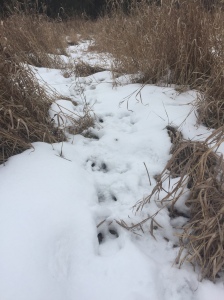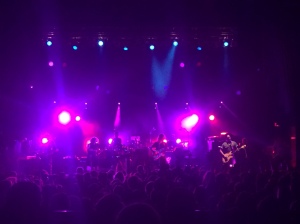Let me tell you about my class I just had.
Albion College is a liberal arts school, and that basically means we can do some weird and cool and unusual stuff.
I was a part of one of the first humanities labs. We brought together four classes– my class (Wild Things), ancient civilizations, a French creole and Cajun class, and the choir.
And one thing is the glue that sticks us together. Encounters with food.

Weird right?
As I sit here and write this, I’m finding it hard to narrow down all the things I could talk about and how it ties into The Climate Pickle. So to prevent myself from endlessly writing, I’ll just talk about the first half of the lab.
We were sent out into the snow-covered woods of the nature center with this passage and one task– to find food signs.
To one who lives in the snow and watches it day by day, it is a book to be read. The pages turn as the wind blows; the characters shift and the images formed by their combinations change in meaning, but the language remains the same. It is a shadow language, spoken by things that have gone by and will come again. The same texthas been written there for thousands of years, though I was not here, and will not be here in winters to come, to read it. These seemingly random ways, these paths, these beds, these footprints, these hard, round pellets in the snow: they all have meaning. Dark things may be written there, news of other lives, their sorties and excursions, their terrors and deaths. The tiny feet of a shrew or a vole make a brief, erratic pattern across the snow, and here is a hole down which the animal goes. And now the track of an ermine comes this way, swift and searching, and he too goes down that white shadow of a hole.
John Haines, The Stars, the Snow, the Fire
I’m enamored with this beautiful language.e. Gives me shivers.
John Haines was this badass dude who lived in Alaska as a trapper, poet, painter, and homesteader, among other things. He didn’t have the leisure of a grocery store to make his dinner. He had to trap animals, intimately place his hands on their warm bodies, and kill them to preserve their pelts, so he could sell them and buy his can of beans.
A lost art in many ways.
Our professors sent us out to find these tracks, follow them, discover something. Mostly how fucking hard it would be. It’s cold, definitely not as cold as Alaska, but still. Maybe you don’t know the language of the snow and have no clue what the hell you’re looking at. If we really were tracking animals and came home empty handed, well shit, your stomach is going to be empty too.

My oldest sister, Justina, is the hunter in the family. After she read my post, she identified the dear tracks in the pictures above; it was a buck. “You can tell because how far apart the points of the hooves are. Bucks are heavier than does, and their body weight spreads the points apart. He’d probably be a shooter, something you’d want to follow,” she told me.
I’ll mention one other part of the lab because I think it increases the difficulty of foraging and hunting. The choir stood up and sang a hauntingly beautiful poem about living alone for long, long stretches of time in the heart of a snow-locked, forested land and that the biggest fear, obstacle, tormenting thought is loneliness. Having nothing, no one. Your thoughts fold and shift like snow blowing in the wind. Illusive, mocking.
Not only do you have to tromp around and kill your food, you might have to do it alone. The only company is the crunching of your boots as they break the icy rind of snow.
We forget about what it’s actually like to forage and hunt for our food. Alone. You’re the only thing you have, and if you don’t find it, all the worse. Alone and hungry.
A grocery store is as close as we get, but we take it for granted. I know I do. A lot of us would be screwed if we didn’t have well-lit and organized grocery stores. And there’s even people who can see the gleaming lights, but have no money or opportunities to waltz in.
As temperatures rise and seasons change, farmers are having a difficult time getting high crop yields every year. Those stores might be empty, and we’ll all be looking into the stores, faces pressed close, breath blooming clouds on the window because it’s just too expensive. Stomachs twisting and rolling in on themselves.





